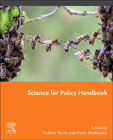
Science for Policy Handbook is aimed at improving the use of science and evidence to increase the impact of knowledge on policy. The Joint Research Centre (JRC) is the European Commission's science and knowledge service. The JRC's position as both a respected research organization and a leading practitioner at the science/policy interface puts it in a key position, via the Handbook, to be able to help provide an overview of this interface. The book will put together in one training, awareness-raising and capacity-building resources for researchers and for policymakers. The Handbook will bring scientifically rigorous advice, referenced and evidence-based to the highest possible extent, curated with a practical, user-focused approach. It will build upon JRC's institutional memory of the lessons learnt in using scientific evidence and advising policymakers. It will be directed to scientists and policymakers. The book is based on a larger body of work in the field of science-policy interaction, conducted by the JRC. Key examples include: Highlights from a political conference 'EU4Facts', focused on the relations of science and policy Conceptualisation of skills for practitioners at the science-policy interface, needed for effective evidence-informed policymaking Training researchers and policymakers on how to bring science and policy closer together In terms of themes, the Handbook identifies key problems underlying the current 'post-fact' context of the policy and political worlds, and proposes various solutions (new types of evidence, scientific methods, skills, etc.). Covers the vital area of science and policy makingIncludes contributions from leading commentators from the JRC/European Commission Conceptualisation of skills for practitioners at the science-policy interface, needed for effective evidence-informed policymaking INDICE: I. Setting the scene 1. Science-policy landscape 2. Science-policy differences 3. How to use the Handbook II. Processes 4. Defining the research question 5. Knowledge MForeword 6. Advising policymakers 7. Communicating scientific knowledge & engaging with citizens and stakeholders 8. Using science in crisis situations 9. Monitoring of impacts III. Advising with specific tools 10. Qualitative analysis 11. Quantitative analysis 12. Place-based solutions IV. What's next? 13. Outlook on the future
- ISBN: 978-0-12-822596-7
- Editorial: Elsevier
- Encuadernacion: Rústica
- Páginas: 266
- Fecha Publicación: 01/07/2020
- Nº Volúmenes: 1
- Idioma: Inglés
